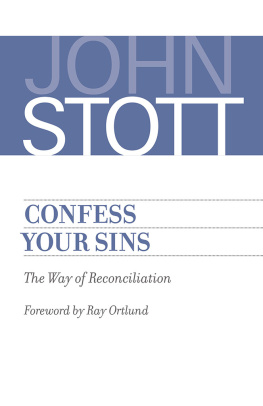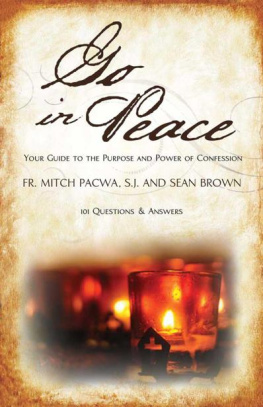How to Make a
Good Confession
Also available from Sophia Institute Press
by John A. Kane:
Transforming Your Life Through the Eucharist
The School of Mary
Six Lessons for Life from the School of the Cross
John A. Kane
How to Make a
Good Confession
A Pocket Guide to
Reconciliation with God





Contents
.......................... vii
Chapter One
................... 3
Chapter Two
.. 21
Chapter Three
Chapter Four
............. 55
Chapter Five
............... 67
Chapter Six
...................... 87
Appendix
Biographical Note
Editor's note: The biblical references in the following pages are taken from the Douay-Rheims edition and the Revised Standard Version (RSV), Catholic Edition, of the Old and New Testaments. Where applicable, quotations from the Douay-Rheims edition have been cross-referenced with the differing enumeration in the RSV, using the following symbol: (RSV =).
Introduction
Our Lord instituted the sacrament of Penance for the forgiveness of our sins and for our reconciliation with God. But a good confession brings us more than forgiveness of our sins; it also provides us with a powerful, grace-filled means to overcome sins.
To ensure that you receive the greatest spiritual benefit from Confession, this book gives you the tools you need to make a good confession: a step-by-step guide through of the rite itself, as well as a detailed list of questions to help you make a good examination of conscience beforehand.
But that information you can find in many other books.
This book goes deeper, showing you how a good confession involves much more than what you do during those few moments you spend in the confessional.
To make a truly good confession, you must have developed - before you enter the confessional - those attitudes of mind and habits of soul that enable you to identify your sins (even hidden ones), to be sorry for them, and to do penance.
This book shows you how to acquire these soulrestoring attitudes of mind and soul so that you will be truly prepared when you enter the confessional, and so that God's manifold graces will flood your soul as you leave it.
How to Make a
Good Confession
Chapter One
Cultivate true contrition

2 Corinthians 7:10
The end of sorrow, both natural and supernatural, is correction, change. Supernatural sorrow must wean the soul from sin and turn it to God; it must, in other words, work repentance, for to repent is to change. The punishment of sin is meant to deter from sin. It is first corrective and then penal.
The child who gorges on sweets will become sick, and the man who washes his hands in scalding water will be burned, because physical laws infallibly enforce their own application. Too intense heat will always burn, and too many sweets will always sicken; hence, neither child nor man will be likely to forget the lesson taught by adversity.
Moral lessons inculcated by the dire effects of sin do not impress themselves upon us so directly, although they are just as efficacious. The first chastisement inflicted by a schoolmaster upon a recalcitrant pupil is corrective, because it constitutes a warning. It becomes penal as often afterward as it must be repeated because of repetition of the misdemeanor.
s
One thought underlies all these texts; they express one dominant truth. And this momentously significant verity that comes out of them all is the idea of constant repentance. For what are sorrow, humiliation, fear, and trembling but emanations of a deep and lasting realization of sin? They are at once the most becoming livery and the most powerful panoply of penitents, and their striking feature is their enduring character.
An inquiry into the cause of penitence reveals the same truth. Penitence is born of a consciousness of sin, and a consciousness of sin deepens with the passing of life. Repentance, therefore, intensifies as we grow older. This progressive development that we experience of the knowledge of sin is seen also in Sacred Scripture. As in ourselves, so in the Bible, the depths of sin are only gradually unfolded.
The sacred writer manifests no surprise at human or divine issues, because he is revealing the God who, since He cannot change, beholds all things with infinite calm and eternal equanimity.
Besides, the Old Testament treats of sin as affecting man socially rather than individually. The anger of God kindled by it and evoking His terrible chastisements, the harrowing effects produced by it in the world, its diffusively virulent nature, its antagonism to God - these unspeakable consequences are stressed rather than the nature of sin in itself and its effect upon man's soul.
The social aspect of sin likewise forms the burden of the Ten Commandments. The greater part of the Gospels themselves deals only with the external results of sin: its hideous deformity, its hateful selfishness, as contrasted with God's infinite love and His eternal beneficence.
Even more graphically than the books of the Old Testament do the Gospels describe these outward effects, because the light of God's incarnate presence is focused upon them. Only in the letters of the apostles, especially those of St. Paul, is the nature of sin thoroughly analyzed, its intrinsic malice clearly shown, and its deadly effect upon man's soul brought to light.
Just as man's disobedience is first simply stated, and its external effect and internal malice afterward vividly described, in the same progressive manner does sin reveal itself to the soul. The commission of the first actual sin is a mere insignificant commonplace, inspiring no reasonable shame or analysis of its cause nor any deep realization of its full enormity. As we grow older, we begin to feel the actual consequences of sin, the evils flowing from it that afflict us and those we love. Gradually the knowledge of its real nature, the secret disorder wrought by it, and the ruin and desolation that it brings into the soul unfold themselves to the mind.
As the years pass, this inward working of sin becomes more vivid, more terrible. It deepens more and more as the end of life approaches; and at the hour of death, even when our lips have been purpled and our souls washed with the blood of our God, even then, just because of the soul's brilliant spiritual beauty, sin becomes all the more foul and ugly. Since, therefore, the keenness of the sense of sin measures the depth of repentance, penitence must grow with advancing years.
Bearing in mind this truth, who can understand the soul's consciousness of sin after death? Then indeed, in the full blaze and radiant splendor of eternal justice, vice will appear ineffably hideous, while the appraisal of sin will be deepest precisely when the soul, after its complete purification in Purgatory, wings its flight to the eternal embrace of its God.












